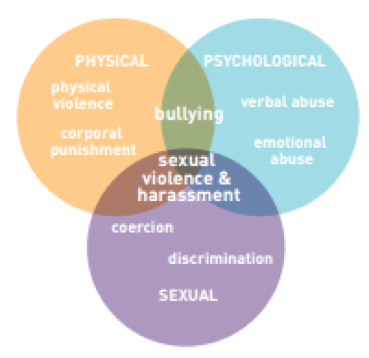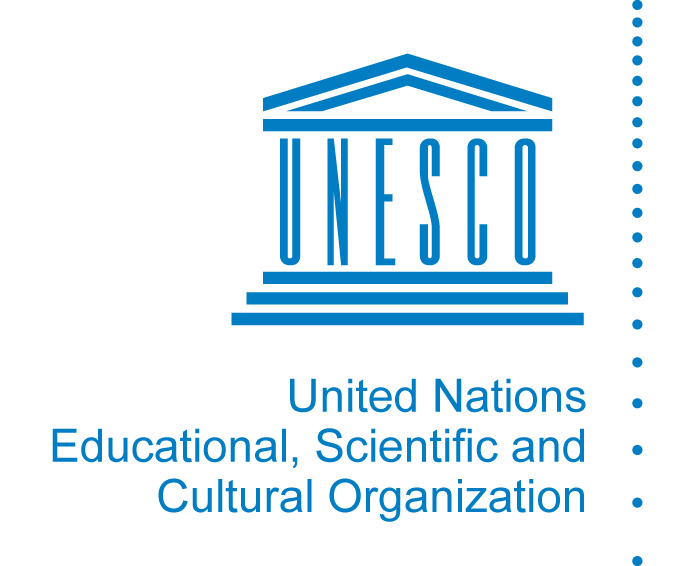What is SRGBV and why does it matter?
‘School-related gender-based violence is defined as acts or threats of sexual, physical or psychological violence occurring in and around schools, perpetrated as a result of gender norms and stereotypes, and enforced by unequal power dynamics.’
Source: UNESCO/UNGEI, 2015 p.1
School-related gender-based violence (SRGBV) is a phenomenon that affects millions of children, families and communities and occurs in all countries in the world. It can be defined as acts or threats of sexual, physical or psychological violence occurring in and around schools, perpetrated as a result of gender norms and stereotypes, and enforced by unequal power dynamics. In every country and region of the world where SRGBV has been studied, incidents have been reported. This kind of violence is pervasive and cuts across cultural, geographic and economic differences in societies.
SRGBV is complex and multifaceted. It includes different manifestations of physical, sexual and/or psychological violence, such as verbal abuse, bullying, sexual abuse and harassment, coercion and assault, and rape. These different forms of SRGBV often overlap and reinforce each other (see Figure 1). SRGBV is one important and pervasive form of school violence; gender is a key driving factor behind many forms of violence and using a gender lens to look at violence can help when developing prevention and response approaches.

Young people have different experiences of SRGBV depending on their sex, their gender identity, their country and context. For example, research shows that girls are more likely to experience psychological bullying, cyber-bullying, sexual violence and harassment. On the other hand, boys often face higher rates of corporal punishment than girls, and are expected to take it ‘like a man’ (Pinheiro, 2006; UNESCO/UNGEI, 2015; UNICEF, 2011).
There is also a growing body of evidence that indicates that most LGBT (lesbian, gay, bisexual and transgender) students report having experienced bullying or violence on the basis of their sexual orientation or gender identity/expression (Plan/ICRW, 2015; UNESCO, 2012a; UNESCO et al, 2014). Children and young people who are perceived as resisting, or as not fitting into traditional or binary gender norms, are at high risk of violence. Children can be victims or perpetrators of SRGBV. Adults in the school environment can also be perpetrators or sometimes victims, reflecting power dynamics and hierarchy between generations and between learners and school staff.
Gender-based violence (GBV) can occur in and around schools, as well as on the way to or from schools. Social media, email and mobile phones are used to perpetrate violence through new mediums, such as cyber-bullying, online grooming and trolling (see Glossary). There are new locales for this abuse (e.g. in online chat rooms) that overlap and reinforce SRGBV on and beyond the school grounds.
SRGBV violates children’s fundamental human rights and is a form of gender discrimination. Children have the right to be protected from all forms of violence, including in their school lives. Experiencing SRGBV can compromise children’s well-being, their physical and emotional health, as well as harming their cognitive and emotional development.
SRGBV interferes with the education of many young people and is correlated with lower academic achievement. It is also a major barrier to the realization of global education goals and targets, as well as specific Sustainable Development Goals (SDGs): to end abuse, exploitation, trafficking and all forms of violence against children in all settings (Target 16.2); to build and upgrade education facilities that are child, disability and gender sensitive and provide safe, non-violent, inclusive and effective learning environments for all (Target 4.a); and to achieve gender equality and reduce gender-based violence (Goal 5).

Education is an important socializing mechanism and it is critical for the social, emotional and psychological development of young people. As such, education is a vehicle for transforming individual behaviours and broader social norms around violence, gender equality and discrimination.
|
Global Working Group to End SRGBV In August 2014, a coalition of governments, development organizations, civil society activists and research institutions came together to collaborate on ending SRGBV. The Global Working Group to End SRGBV is co-hosted by the United Nations Girls’ Education Initiative (UNGEI) and the United Nations Educational, Scientific and Cultural Organization (UNESCO), with funding from the Swedish government, Norwegian government and United States Agency for International Development (USAID). The group provides a platform for developing research, guidance and advocacy to enhance understanding of, and support better quality responses to, school-related gender-based violence. Further information on the Global Working Group to End SRGBV and resources on SRGBV produced by the Working Group’s member agencies can be accessed at UNGEI’s website. |
